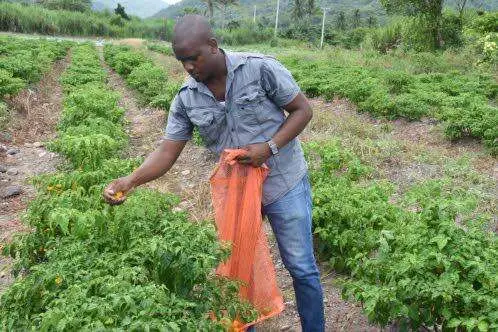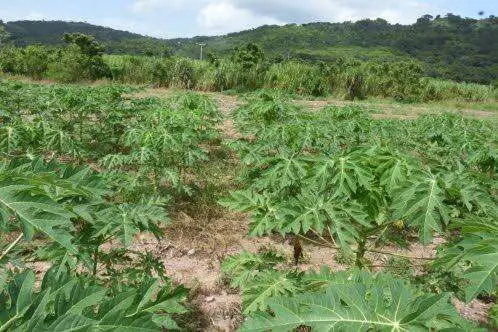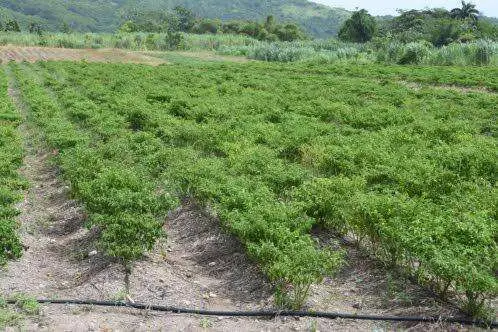
Agriculture’s Rhule
Fabian Rhule has been operating his own farm for just eight months, but the 35-year-old is convinced that he’s doing the right thing and has successfully pursued academic qualifications to enhance his knowledge of the sector.
Today, Rhule is in the final stages of completing a master’s degree in agricultural entrepreneurship at The University of the West Indies (UWI), Mona campus.
Already he holds an associate’s degree and a Bachelor of Technology in Agriculture Production and Food System Management from the College of Agriculture, Science and Education (CASE).
“I do have a passion for agriculture, I believe in it,” he told the Jamaica Observer during a recent interview on his farm. “People keep asking, ‘every time you go back to study is agriculture yu doing?’ they just don’t understand that I don’t see anything else, can’t see anything else; this is it for me.”
After spending 11 years working on and off with what is now known as JP Farms, and a brief tenure in the tourism industry, Rhule finally decided that this year was the time to branch out on his own. Therefore, since February he has been farming scotch bonnet peppers and papayas on four of his 50 acres of land in Chovey, St Mary.
“I used up my personal savings and did a business plan and got some money from the PC (National People’s Co-operative Bank of Jamaica Limited) bank, so that’s what I’m doing here — trying to expand as fast as I can because the demand for the scotch bonnet pepper, both locally and (export) processors, is tremendous,” Rhule told the Observer.
It was the viability of the scotch bonnet market that led the farmer to shift focus from bananas, the crop that he knew more about. Despite having to adjust to a whole new crop, Rhule said that his understanding is constantly growing and things have been going very well so far.
Rhule, who is originally from St Andrew, had no strong familial link to agriculture and really developed his passion for farming during high school.
Pointing out that he does everything by the numbers, Rhule explained that as an agriculturalist he approaches farming from a business point of view.
“I don’t approach it where I grow things and it haffi sell, it haffi grow. I approach it more like a business. I do the numbers for pepper and look at the returns,” Rhule stated.
“I work from the market backwards, so I know there is a demand for scotch bonnet. I can’t compete with the large banana growers, it just nuh mek nuh sense, but pepper, I know there is a market for it. people growing (West Indian) red pepper, but I decided not to go with red pepper,” he said.
This, Rhule explained, was after having a bad experience with the main prospective buyer of the red peppers and so he decided against venturing into it and, so far, has no regrets.
Regarding the management of the farm, Rhule said there is a nursery where he sources his seedlings and he currently employs four full-time workers and two weekend workers. He said that the pepper business can be quite labour-intensive and so employment numbers can and will go up, depending on the cycle he is in.
“When I have a peak season, yu a look at 10 to 15 people at a time, and when the farm grows, you gonna be looking at up to 30 or more. It is intensive, and once they pick it they make money, so people naturally gravitate towards pepper. so mi nah complain, because it a mek sense,” Rhule said.
He explained that currently, he has two processors and several higglers that he supplies with his peppers, but he is also in talks with some exporters.
Rhule acknowledged that a successful outcome of his discussions will require him to adopt a more aggressive expansion plan, therefore he has 100,000 seedlings from the nursery to be transplanted.
But the farmer noted that there are still some challenges hampering his expansion, the main one being a lack of heavy equipment to prepare land for planting.
“In terms of land preparation, I don’t have a tractor and if I have 50 acres without the use of tractor, I won’t go at the pace which I want to go. Around these parts, you have a few tractors that people have for their personal farms and it’s hard to get it from them,” Rhule said.
He said while people are willing to lend or rent their tractors, other complications arise such as the time they are available for use.
Therefore, Rhule is trying to get a tractor of his own, but he has been frustrated by the refusal of banks to give him a loan.
“I was told I can’t get the loan for the tractor and I’m like really, how is that possible? If it is that I want a car now, you are ready to give me a car to drive around, which is liability. I want a tractor to expand my business — which we are talking about growth more than anything else these days — and I can’t get a loan to buy my tractor,” the young farmer reasoned.
He said that the banks need to revisit their policy to see how best they can facilitate especially young farmers, who have the zeal and willingness to plant and produce.
Rhule said that when one looks at Jamaica in terms of agriculture, “we can talk until tomorrow, but there are several areas that need to be addressed including storage, food security, and access to capital”.
“Because, even when I did my business plan and applied for the loan for my farm, I find that I spend almost $300,000 just to get that loan. So I think to myself… if a young man just fresh out of CASE or UWI wanted to start their own business, how will they get close to $300,000?” Rhule questioned.
“I had to provide land because I used collateral, and I had to get a survey report done for $40,000. The amount of money I spend just to get that loan it just nuh mek no sense; all of these things we need to revisit,” he said.
Rhule pointed out however that he cannot completely berate the entire system as people are “still getting by”, but things can be way better.
He views his election as vice-president of the Jamaica Agricultural Society’s (JAS) St Mary branch as a possible turning point in terms of continuity for the organisation, as it was the JAS that invited him to join the farmers’ lobby group.
Rhule added that his election is also an indication that the JAS is looking at young people in a very serious way.
The young farmer said that as it relates to the future of the agriculture sector, he would love to see more being done as it relates to food security as well as an increase in public-private partnerships.
“When you look at a fruit like banana, I believe that banana should be more accessible in schools because of its nutritional value, so why not say the Ministry of Education offer to partner with the agriculture ministry and the growers to have banana accessible in schools across Jamaica?” Rhule queried.
“And you will see that trickle-down effect to farmers… it needs fine-tuning, it kinda rough around the edges, but we need that will from the policy-makers to really make that possible,” he added.



























